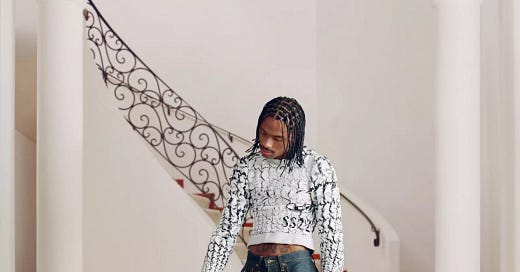Three times a year the planet Mercury moonwalks across the galaxy to travel backwards. This regressive motion, known as the retrograde, returned on Friday and will persist until mid-May. If you’re someone who consults the stars or someone who consults TikTok’s For You Page, you likely have already been primed to be extra cautious during a Mercury retrograde. As Mercury rules language, intelligence, news, technology and memory, this season is conveniently offered as the scapegoat for why our communication is disrupted, why our emotions are in a funk and why the vibes are generally off. Despite a lack of scientific evidence and NASA’s confirmation that the mercurial retrograde is, in fact, an optical illusion, we are told not to make any major decisions during this period and not to sign new contracts. We are told that unfinished matters may resurface as ex-lovers and long-lost friends attempt to spring back into our lives like weeds through the cobblestone. And, as Mercury is the ruling planet for Gemini, a star sign with a reputation for being a sharp, expressive communicator, we are also told that the retrograde affects Geminis the most.
The planets and their symbolism have been a preoccupation for musician and Gemini Steve Lacy. From his debut album Apollo XXI to his most recent release, Gemini Rights, Lacy skilfully narrates the peaks and pits of his most intimate relationships, relationships that he brazenly displayed on a sold-out tour last fall. With the first stanza of the tour’s opening song, Lacy transplants his fevered audience into his world: “Hey, I fell in love with you. I don’t know where I am.” Despite his expressed befuddlement and the lyric’s gesture to his lack of spatial awareness, Lacy has pegged his listener precisely where he wants them. It is not as much of a “where,” as that would imply a firm latitudinal setting but moreso a “what,” a channel of sorts, where he cycles the crowd through a kaleidoscope of big, looming feelings that encircle a romantic fixation of his. Immediately, we know we are in for a “big talk,” the type of conversation your best friend pulls you into in the bathroom of a crowded party to privately gush their feelings on a failed situationship or a budding new love. However, the conversation Lacy has with you is not private. It’s public and being live streamed, tweeted, posted and recited word-for-word by a herd of teenagers and early twenty-year-olds who are intimately familiar with the intricacies of Lacy’s dating life, angsty presented on Gemini Rights.
At this particular millisecond, Lacy is the premier musician occupying the lease on Gen Z’s attention. His seemingly rapid eruption from alternative record producer to mainstream pop star can appear startling and unprecedented. Yet, to his fans, who wail every lyric, his ascension has been a long time coming. For years, Lacy has been associated with some of the most acclaimed musicians who have developed an engrossing, cultish fan base. Frank Ocean, Tyler, the Creator and Solange, all past collaborators of Lacy, come to mind. The emotionally taxing fan bases of Lana Del Rey, Mitski and SZA are also summoned amidst the cries of teenagers belabouring his dejected verse in unison at the show. His closeness to his fan’s emotions is rare for an artist of his succession. His base appears niche, “alternative” to the naked eye which, in turn, emboldens the promise of Lacy’s popularity. You feel like you’re in on “a new thing,” at the cusp of a fresh voice at the crux of a smattering of cultural intersections. But then you realize that your new favourite pop star, the one who intricately authors your relationship hurdles with laser-like precision in catchy hooks like “I wish I knew you wanted me,” has a number one record and is not singing just to you. He’s belting to a sold-out crowd, the mainstream masses and is excavating his history to serve as a mirror to your romantic mishaps. It’s at this precise moment that you understand his widespread appeal makes him less of a Solange and more of a Swift, as he offers up personal anecdote after personal anecdote, often naming past lovers directly, in relatable melodies that the majority can see themselves in.
I wonder if this emotional labour for Lacy is tiresome, being the orator and receiver of such catastrophic feelings. But if it is a burden, he shoulders the weight well. Vocalling wading through a sea of iPhone 14s all positioned to capture his every moment, he pauses the show for a third time to have his security attend to a passed-out concertgoer. In a moment, he shifts his stance from god-like, rock star to the attentive caretaker, offering water and halting the concert until his fan is safely escorted out. Something about Lacy’s intoxicating verse and delivery has ushered a generation of youth to dose themselves out of consciousness in an effort to connect to his love songs. I flippantly ask my friend, Kurt, to imagine what would drive a series of individuals to sequentially induce themselves beyond lucidity to connect to a queer, Black man from Compton’s story of yearning and heartbreak. Kurt stares at me blankly, as if it were a trick question. “Love,” he responds and, at once, it’s all clear.
Lacy flutters towards, sniffs and ultimately dunks on the idea of love in his intimate set on his Give You The World Tour that I had the privilege of experiencing on a Sunday night in Brooklyn. I came to the show with an acceptable literacy of Lacy’s work, warmed by his contribution to the alternative rhythm and blues project The Internet but, like many concertgoers, I was eager to capture the lighting-in-a-bottle moment of an artist on the rise. Within the week of the concert, Lacy not only topped the Billboard Hot 100 but simultaneously topped five charts across genre: Hot R&B Songs, Hot R&B/Hip-Hop Songs, Hot Rock Songs, Hot Rock & Alternative Songs and Hot Alternative Songs. This intersection of sound illustrates the culture’s movement to reject categorization and, specifically, Gen Z’s apprehension to subscribe to a particular label. Not only is Lacy post-genre, during the show he also exclaims that he is post declaring his sexuality when addressing the question of whether he is bisexual or homosexual. Lacy cheekily concludes that he’s just “sexual” and his audience erupts, somewhat satisfied with this classification.
And perhaps this is what being a modern male pop star is. Lacy’s diversion of traditional gendered portraiture, his expressively queer fashion and fan base, puts him in conversation with mainstream juggernauts such as Harry Styles and Bad Bunny. The softness, #SadBoiEnergy and vulnerability of his songwriting are reminiscent of the former male pop star guard, Drake and The Weeknd. But, on stage, his command of the audience transcends generations. He’s Prince. He’s Stevie Wonder. He’s Lenny Kravitz. He’s a “New Negro” in skin-tight, black leather pants as he rotates through instruments, unwilling to let the audience box him into a categorical soundscape. He moves from a heady, electric guitar solo to an operatic falsetto in a matter of minutes. He’s Ansani with a blowout. Above all, he’s a Gemini.
At first, when the show began, my friend and I found ourselves distracted by the consistent glare of iPhone screens blocking the view of the stage. A few times, I caught myself gazing at his performance through a neighbour's screen rather than hunching forward and witnessing him in the flesh. As the rambunctious audience swelled around me, I wondered how Lacy must feel as a flurry of Silicon Valley-manufactured fireflies winked back at him. Then, I remembered that it’s likely that the majority of the room first experienced Lacy through their phones. His hit “Bad Habit” had been viral on TikTok for a full season, contributing to his catapult to stardom and further illustrating his hold on a generation. To experience Lacy’s performance through your camera roll isn’t a distraction; it’s kismet. The embodiment of the circular relationship between Lacy and his generation of fans.
For those few hours, the dazzling Lacy was able to encapsulate the fever and longing of a generation. An auteur in the making, on the precipice of a cultural landslide. The response to his delivery bordered between adoration and hysteria, harkening back to videos I'd seen of fans at The Beatles or Michael Jackson concerts. The fandom assumed form in the lengthy line for concert merchandise before the show and, later, as the herd walked to the L train, replaying and reliving the performance through frenzied video clips on phones.
On the song “Mercury,” Lacy nods to his magnetic pull that draws lovers and fans alike to him. “You think that I’m two-faced, I can name twenty-three,” he croons, referencing the duality of his zodiac sign. It’s this multifacetedness, his shape-shifting of identity and genre, that connects to a diversity of listeners. He pledges “I don’t think I’m the one but I can be your girlfriend ‘til retrograde is done,” and it appears, for his fans and for us this retrograde, perhaps that commitment is just enough.

This retrograde occurs in Taurus, a sign known for its emphasis on boundaries, comfort, finances and security. (Read: they are the cool aunt who is fancy as fuck). As we slide into the next few weeks, I deliberate what could be learned from Lacy. If you couldn’t tell, Gemini Rights is a break-up album. However, instead of pointing his finger at his ex-lovers’ faults, Lacy aptly positions himself on the pedestal, speaking from an actualized, ‘I’m-beyond-this’ perspective. He occupies the vantage point of someone unwilling to allow their self-worth to be eroded by dating someone who sucks. He singsongs on “Cody Freestyle,” “Why settle for lesser when I could do better? Or Hector? Or Jacob? Or Kenny? There’s plenty.” There’s an air of opulence to his endless options in the wake of his glow-up. We indulge in this preserved sense of self again on “Static” where he proclaims to the crowd, “If you had to stunt your shining for your lover: dump that fucker.” Lacy’s cut-off game is too strong and emblematic of the boundary setting required to prevail this Mercury retrograde in Taurus. Protect your energy and luxuriate in yourself. Focus on your growth and block anything in opposition to that. And don’t text him back! I mean, if you believe that sort of stuff, anyways. Sometimes, I do. Sometimes, I don’t.








